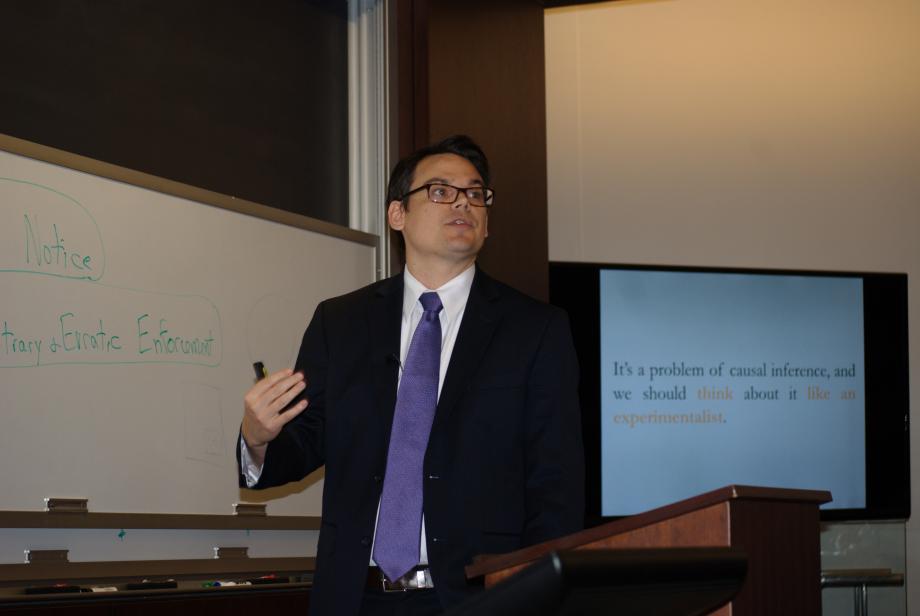Chilton: Experiments Could Test Whether International Treaties Work

Social science experiments examining how information shapes people’s views could help test the potential effectiveness of international treaties on war and human rights, Assistant Professor Adam Chilton argued in a recent Chicago’s Best Ideas lecture that drew about 100 students.
The controversial issue of whether human rights laws have failed is the subject of a new book by Eric Posner, Kirkland & Ellis Distinguished Service Professor of Law, and was also the focus of an October conference organized by Chilton and Posner. In his CBI lecture, Chilton added another layer to the discussion — first explaining why it’s so hard to tell if treaties make a difference and then proposing empirical solutions.
“There’s no consensus on whether international laws on human rights or international laws on war have any effect,” he said. “I don’t mean whether they have a dramatic effect on state behavior — I mean any effect at all.”
He said part of the reason scholars don’t know whether international treaties affect state behavior is that it is difficult to tease out causality through direct observation for a variety of reasons, including selection bias and a lack of variance.
“A country’s likelihood of signing an international agreement is systematically related to its likely human rights practices,” he said. “It might be the case that some countries sign on to the treaties because they already have great human rights practices. It can also be the opposite: A lot of dictators have never seen a human rights treaty that they didn’t like to sign. They’ll sign agreements even if they don’t plan to honor them.”
Instead, Chilton suggested getting at the issue by testing whether the mere existence of an agreement would change people’s views on human rights reform. Then he pointed to an experiment that suggests that it might.
In that test, people were given differing information about the United States’ use of solitary confinement in prison. They were then asked if they approved, disapproved, or neither approved nor disapproved, of a proposal to reform solitary confinement practices. There were three groups of subjects:
- The control group wasn’t offered any argument against solitary confinement.
- The placebo group was told that critics believe solitary confinement should eliminated, except in extreme cases, because it violates prisoners’ human rights — an appeal to the idea of human rights without any reference a legal mechanism for enforcing it.
- A third group was given the “international law treatment.” They were told that critics believe solitary confinement should be eliminated, except in extreme cases, because it violates international human rights treaties that the United States has signed.
The experiment found that the third group was more likely than the placebo or control to approve of reforms. The results of this one experiment weren’t enough on their own to prove that international treaties work, Chilton said, but they do suggest that appealing to domestic politics might have some merit. This type of experiment could be repeated with other types of rights and treaties.
“If you find evidence that it actually does move people, that suggests that the agreements might do something,” he said. “It’s not definitive proof, but it starts to move in the right direction. And I think it’s important that we start to move in this direction, because we’re now 20 years into trying to study these problems with observational data, and we’ve made very little progress.”